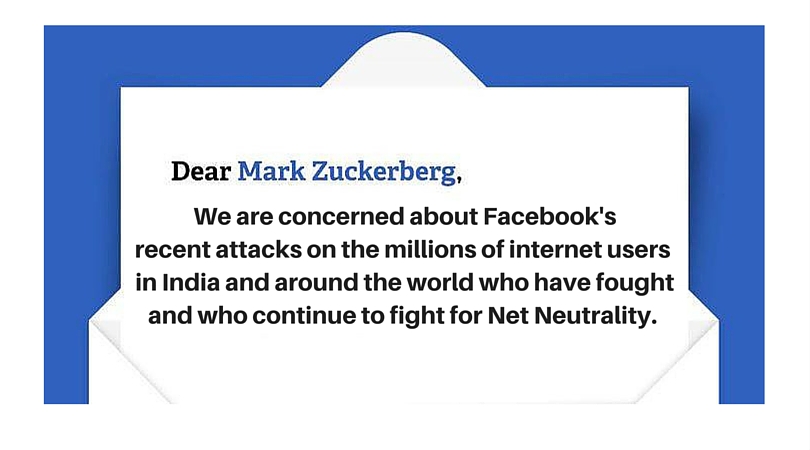More than 30 groups from around the world have signed an open letter to Mark Zuckerberg regarding Facebook’s recent actions concerning the Free Basics program in India. The letter urges Facebook to meaningfully and respectfully engage with Net Neutrality advocates who are fighting for a free and open internet across the globe.
Dear Mark Zuckerberg,
You have said that “connecting the world is one of the greatest challenges of our generation.” We all agree. We also believe that a connectivity agenda must respect the right of all to equally access, receive, and impart information. For this reason, we are concerned about Facebook’s recent attacks on the millions of internet users in India and around the world who have fought, and who continue to fight, for Net Neutrality.
First up we would like to acknowledge that Facebook has positively responded to the public’s concerns by making important fixes to the security, privacy, and transparency of Internet.org and Free Basics. But we are troubled about recent actions regarding Free Basics in India.
Facebook is encouraging its users to take action against Net Neutrality rules and protections being considered by the Regulatory Authority of India (TRAI).
Facebook has been urging users in India, and Facebook users in the United States and the United Kingdom (recognized by Facebook as a mistake), to sign a petition that claims that “a small, vocal group of critics… demand that people pay equally to access all Internet services, even if that means one billion people can’t afford to access any services,” and that “unless you take action now, India could lose access to free basic Internet services, delaying progress towards digital equality for all Indians.”
These claims are disingenuous and serve only to create oppositional camps that many of us have worked hard to overcome.
The group of people supporting Net Neutrality is not small, and it vocally advocates for the digital equality Facebook claims to support. It includes more than a million Indian users, elected political representatives, development workers, respected platform providers, and technology leaders.
It is concerning that Facebook — which says it supports Net Neutrality — would attack those who have sought to enshrine this fundamental principle in law. Such a move is an insult to millions in the fast-growing global community that cares about safeguarding the open internet.
In addition, Facebook’s actions embolden telecommunications carriers in their broader efforts to stop Net Neutrality protections from being passed across the world — particularly in emerging nations and elsewhere in the Global South — by creating the false impression that there is a grassroots movement opposed to Net Neutrality. You have repeatedly voiced support for Net Neutrality, so we are confused as to why Facebook is now portraying Net Neutrality advocates as opponents.
Meanwhile, in its quest to gain support for its controversial Free Basics program, Facebook continues to assert statistics and arguments — most recently in a full-page ad in some of India’s biggest newspapers — that lack proper sourcing and that rely on straw man arguments. Rather than create digital equality as your petition claims, Facebook’s Free Basics program risks exacerbating digital inequality. It creates a paradigm in which services from Facebook and its Free Basics partners are free, while everything else remains paid. At most the world’s poorest people get partial access to the internet. If you think access to the internet is a right like access to health care and clean drinking water, then Facebook should support affordable access to the entire internet for everyone, not access only to those services that Facebook or its partners deem acceptable.
Finally, it’s necessary to correct the public record on a crucial issue regarding Net Neutrality regulations. Contrary to another of Facebook’s assertions, Net Neutrality rules in the European Union do not endorse the practice of zero rating. Rather, Free Basics falls well outside the definition of “internet access” in the new EU legislation. Similar rules in the United States and Canada allow for consideration of violations on a case-by-case basis.
As India and other countries determine their Net Neutrality rules, we ask that Facebook meaningfully and respectfully engages with ordinary users, activists and advocates without engaging in unfounded and divisive attacks.
Signed,
Access Now – Global
ACI – Participa – Honduras
Asociación Colombiana de Usuarios de Internet (ACUI) – Colombia
Alternative Informatics Association – Turkey
Center for Cyber Security Pakistan – Pakistan
Center for Media Justice – United States
Centre for Internet & Society – India
Data Roads Foundation – United States
EDRi – Europe
Fight for the Future – United States
Free Press – United States
Free Software Movement of India – India
Fundación Acceso – Central America
Future of Music Coalition – United States
International Modern Media Institute – Iceland
Internet Policy Observatory Pakistan – Pakistan
Intervozes – Brazil
IPANDETEC – Panamá
IT for Change – India
IT-Political Association of Denmark – Denmark
Jhatkaa – India
Just Net Coalition – Global
Kaya Labs – South Africa
La Quadrature du Net – France
Media Alliance – United States
Media Mobilizing Project – United States
OpenMedia – Global
R3D, Red en Defensa de los Derechos Digitales – Mexico
Samuelson-Glushko Canadian Internet Policy & Public Interest Clinic (CIPPIC) – Canada
SavetheInternet.in – India
Society for Knowledge Commons – India
SonTusDatos (Artículo 12, A.C.) – Mexico
Software Freedom Law Center (SFLC.in) – India
TEDIC – Paraguay
Unwanted Witness – Uganda
Usuarios Digitales – Ecuadar
Vrijsschrift – The Netherlands
Xnet – Spain
Zimbabwe Human Rights Forum – Zimbabwe
18 Million Rising – United States
